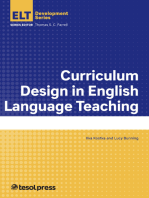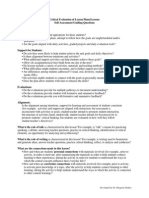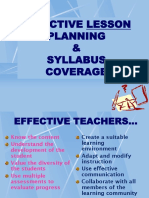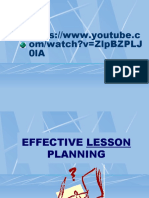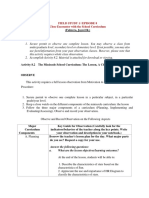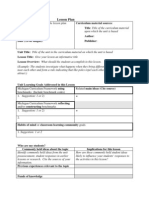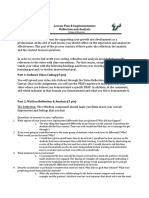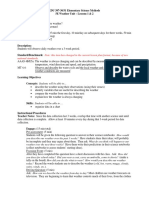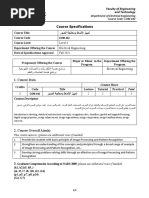1 Lesson Plan Self Assessment 1
Uploaded by
Neha Sharma1 Lesson Plan Self Assessment 1
Uploaded by
Neha SharmaCritical Evaluation of Lesson Plans/Lessons
Self-Assessment Guiding Questions
Teacher’s Intentions:
• Are goals well defined and appropriate for these students?
• As you read through the plans, attempt tofollow how the goals are taught/modeled and/or
practiced?
• Are the goals aligned with daily activities,graded projects and daily evaluation tools?
Support for Students:
• Do activities seem likely to help student achieve the unit goals and daily objectives?
• Is there alignment between intentions and activities?
• What additional support activities canhelp students achieve these goals?
• (How) do assignments/activities build from one day to the next?
• Do lessons include a variety of activities, materials and teaching methods?
• What difficulties might students encounter, and is further support provided?
• Are differences among students addressed? (visual, oral, diversity, students with special
needs, ESL).
• Do activities enable students to connect withthe goals in personally meaningful ways?
• Does the plan allow students with time to rehearse the skills?
Evaluations:
• Do the evaluations provide for multiple pathways to document understanding?
• Do the evaluations provide student with formative and summative feedback?
• Do the evaluations provide you with formative and summative feedback?
Alignment:
Is the alignment among intentions, support for learning and assessment of students consistent
(for example: activities and support are aligned with instruction, but assessment is
inconsistent with activities or goals; student teacher intends to promote student interaction,
but structure of activities limits student talk; student teacher intends for lesson/activity to
promote students’ critical thinking, but students are evaluated on how well they follow
student teacher’s directives)?
What is the role of talk as characterized in this lesson? For example, is “talk” a means for practicing
speaking, a debate, answering teacher questions, practice in critical thinking, identification of critical
elements, an opportunity for analyzing and synthesizing?
What is the role of writing as characterized in this lesson? For example, is writing used to brainstorm
and generate ideas, answer teacher questions, practice critical thinking, reflect, to analyze and synthesize?
What are the connections made in this lesson?
• How and when are students'personal connections with materials involved (for example., prior to
activity, in order to motivate, after summarizing the materials in order to help students connect
learning to their experiences, during the activity in order for students to understand the ways in
which the central concepts influence their everyday life)?
• How and when arecurricular connections with materials involved (for example, prior to activity,
to activate prior knowledge of a topic, after the activity to help students connect learning to other
learning, during the activity to help students understand the ways in which the activity is connected
to other content learning)?
Developed by Dr. Margaret Finders
You might also like
- The Growth Mindset Classroom-Ready Resource Book: A Teacher's Toolkit for For Encouraging Grit and Resilience in All StudentsFrom EverandThe Growth Mindset Classroom-Ready Resource Book: A Teacher's Toolkit for For Encouraging Grit and Resilience in All StudentsNo ratings yet
- Metacognitive Reading and Annotating - The Banking Concept of Education100% (1)Metacognitive Reading and Annotating - The Banking Concept of Education5 pages
- People Interacting: 150 Activities to Promote Self Awareness, Communication, Social and Problem-Solving SkillsFrom EverandPeople Interacting: 150 Activities to Promote Self Awareness, Communication, Social and Problem-Solving SkillsNo ratings yet
- Humanizing Classroom Management: Restorative Practices and Universal Design for LearningFrom EverandHumanizing Classroom Management: Restorative Practices and Universal Design for LearningNo ratings yet
- Effective Lesson Planning & Syllabus Coverage100% (1)Effective Lesson Planning & Syllabus Coverage32 pages
- Classroom-Ready Resources for Student-Centered Learning: Basic Teaching Strategies for Fostering Student Ownership, Agency, and Engagement in K–6 ClassroomsFrom EverandClassroom-Ready Resources for Student-Centered Learning: Basic Teaching Strategies for Fostering Student Ownership, Agency, and Engagement in K–6 ClassroomsNo ratings yet
- Transform Adult Education: Expert Teaching Strategies for EducatorsFrom EverandTransform Adult Education: Expert Teaching Strategies for Educators5/5 (2)
- 2018 03 14 10 11 16 1106400196 Effective Lesson Planning 1No ratings yet2018 03 14 10 11 16 1106400196 Effective Lesson Planning 136 pages
- Field Study 1 Ep 8 Close Encounter With The School Curriculum Fabrero Jayrel RNo ratings yetField Study 1 Ep 8 Close Encounter With The School Curriculum Fabrero Jayrel R6 pages
- Being a 21st Century Educator: Five Trends You Really Want to KnowFrom EverandBeing a 21st Century Educator: Five Trends You Really Want to Know3.5/5 (2)
- Kent Arc Tuburan - Learning Task 3_Critiquing a Sample Detailed Lesson PlanNo ratings yetKent Arc Tuburan - Learning Task 3_Critiquing a Sample Detailed Lesson Plan3 pages
- Learning & Study Guide for Adult Students: Teacher's ManualFrom EverandLearning & Study Guide for Adult Students: Teacher's ManualNo ratings yet
- The Teacher's Guide to Intervention and Inclusive Education: 1000+ Strategies to Help ALL Students Succeed!From EverandThe Teacher's Guide to Intervention and Inclusive Education: 1000+ Strategies to Help ALL Students Succeed!No ratings yet
- How To Be a Great Teacher: Your Step-By-Step Guide To Teach Students EffectivelyFrom EverandHow To Be a Great Teacher: Your Step-By-Step Guide To Teach Students EffectivelyNo ratings yet
- I Is for Inquiry: An Illustrated ABC of Inquiry-Based Instruction for Elementary Teachers and SchoolsFrom EverandI Is for Inquiry: An Illustrated ABC of Inquiry-Based Instruction for Elementary Teachers and SchoolsNo ratings yet
- HCPS Pre-Observation Conference Guide - TSLT 3.12No ratings yetHCPS Pre-Observation Conference Guide - TSLT 3.122 pages
- Ede 4944 CT Observation 1 Video Reflection ChartNo ratings yetEde 4944 CT Observation 1 Video Reflection Chart4 pages
- Lesson Plan & Implementation: Reflection and Analysis: Questions To Answer in Your ReflectionNo ratings yetLesson Plan & Implementation: Reflection and Analysis: Questions To Answer in Your Reflection4 pages
- Detailed Lesson Plan in Math 3 SymmetryNo ratings yetDetailed Lesson Plan in Math 3 Symmetry12 pages
- Assessment 2 Lesson Planning and SequencingNo ratings yetAssessment 2 Lesson Planning and Sequencing2 pages
- 7th Grade Measuring The Weather Lesson Plan100% (1)7th Grade Measuring The Weather Lesson Plan4 pages
- Wbscte - Application Form For HMCT, Mopm, 3dag, Pharmacy, PDPC, Pdme (2013-14)No ratings yetWbscte - Application Form For HMCT, Mopm, 3dag, Pharmacy, PDPC, Pdme (2013-14)5 pages
- Reading Assessment Behavioral Checklist - Form 2No ratings yetReading Assessment Behavioral Checklist - Form 21 page
- EDUC5272 Week 3 Written Assignment Unit 3No ratings yetEDUC5272 Week 3 Written Assignment Unit 38 pages
- The Lack of South Asian Inclusion in the Literary CanonNo ratings yetThe Lack of South Asian Inclusion in the Literary Canon4 pages
- Program 14th LUMEN RSACVP 2020 21.05 PDFNo ratings yetProgram 14th LUMEN RSACVP 2020 21.05 PDF46 pages
- Australian National Identity. - Young Peoples' Conceptions of What It Means To Be AustralianNo ratings yetAustralian National Identity. - Young Peoples' Conceptions of What It Means To Be Australian17 pages
- Exploring Teaching English Using ICT in Vietnam: The Lens of Activity TheoryNo ratings yetExploring Teaching English Using ICT in Vietnam: The Lens of Activity Theory16 pages
- Summary Using Music To Support The Literacy Development of Young English Language Learners100% (1)Summary Using Music To Support The Literacy Development of Young English Language Learners2 pages
- Dissertation Topics On Community Health Nursing100% (2)Dissertation Topics On Community Health Nursing4 pages
- Importance Nof Early Language Literacy and Numeracy86% (7)Importance Nof Early Language Literacy and Numeracy1 page

